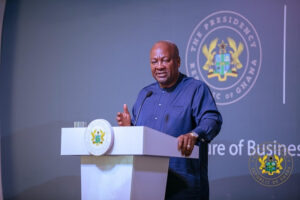How the Ghanaian Government Raises And Spends Money: Taxation And Budgeting Explained

Every year, the Government of Ghana—like any other government—must figure out how to raise money and how to spend it. This is essential for providing services like healthcare, education, security, and infrastructure. But where exactly does this money come from, and how is it spent? This article breaks down how Ghana raises revenue through taxation and allocates it through a structured national budget.
How Ghana Raises Money
The government raises money primarily through taxation, grants, loans, and non-tax revenue. These income sources make up the total government revenue and are managed by the Ministry of Finance and institutions like the Ghana Revenue Authority (GRA).
1. Tax Revenue
Taxation is the most important and reliable source of income for the government. It can be divided into two broad types: direct taxes and indirect taxes.
a. Direct Taxes
These are taxes levied directly on income, profits, or property. Common examples in Ghana include:
Personal Income Tax – Paid by individuals on salaries, wages, and freelance work.
Corporate Tax – Paid by registered companies on their profits.
Property Tax – Collected by local governments on real estate properties.
Capital Gains Tax – Charged on profits from selling assets like land or shares.
b. Indirect Taxes
These are taxes imposed on goods and services, often included in the purchase price.
Value Added Tax (VAT) – A tax on the value added to goods and services at each stage of production.
Import and Export Duties – Charged on goods brought into or sent out of the country.
Excise Duties – Taxes on specific goods such as alcohol, fuel, and tobacco.
The Ghana Revenue Authority is responsible for collecting these taxes and ensuring compliance.
2. Non-Tax Revenue
This includes money the government earns from:
Licensing fees (e.g., vehicle registration, mining licenses)
Dividends from state-owned enterprises (SOEs)
Rent from government properties
3. Grants and Aid
Ghana also receives grants from international bodies like the World Bank, the European Union, and bilateral donor countries. These funds are often earmarked for development projects such as rural electrification, education, or health care improvements.
4. Borrowing (Loans)
To fund budget deficits (when expenses exceed income), the government borrows money:
Domestically, through Treasury Bills and Bonds sold to banks and the public
Externally, from institutions like the IMF, World Bank, or foreign governments
Borrowing must be managed carefully to avoid debt distress, a growing concern in Ghana in recent years.
How the Government Spends Money
Every year, the government of Ghana presents a national budget to Parliament, usually in November, for approval. This budget outlines:
How much money the government expects to collect (revenue)
How much it plans to spend (expenditure)
How any gaps will be financed (borrowing)
1. Recurrent Expenditure
This is the money spent on the day-to-day operations of the government.
It includes:
Salaries and wages for public sector workers (teachers, doctors, police)
Office running costs (utilities, logistics, maintenance)
Transfers to agencies and local governments
This type of spending is necessary to keep the country functioning smoothly but often consumes a significant portion of the budget.
2. Capital Expenditure
These are investments in infrastructure and development, such as:
Road construction and rehabilitation
Building schools, hospitals, and water systems
Energy projects like hydro or solar power
Railways and ports
Capital expenditures are essential for long-term economic growth and are often funded by loans and development partners.
3. Statutory Payments
Some payments are mandatory and must be made by law. Examples include:
Interest payments on national debt
Transfers to the District Assemblies Common Fund
Contributions to the Ghana Education Trust Fund (GETFund)
Payments to Social Security (SSNIT) and Pension schemes
These obligations take priority in budget allocation and leave limited room for new initiatives.
Examples of Ghana’s Spending Priorities
In recent years, Ghana has prioritized key sectors in its annual budgets:
a. Education
Free Senior High School (Free SHS) policy
Classroom infrastructure, textbooks, and teacher recruitment
b. Health
Construction and rehabilitation of hospitals (e.g., Agenda 111)
Supply of medicines and vaccines
Payment of National Health Insurance Scheme (NHIS) claims
c. Infrastructure
Roads and bridges under the “Year of Roads” campaign
Expansion of electricity coverage
Affordable housing projects
d. Agriculture and Industry
Planting for Food and Jobs
One District, One Factory initiative
Subsidies for fertilizers and equipment
Challenges in Revenue and Budgeting
Despite its efforts, Ghana faces several fiscal challenges:
1. Low Tax Compliance
Many informal businesses and individuals do not pay taxes, reducing government revenue.
2. Heavy Debt Servicing
A large portion of the budget is used to pay interest on loans, leaving less for development.
3. Overdependence on Borrowing
Frequent borrowing leads to a debt burden that future generations must pay.
4. Inefficient Spending
Delays, corruption, and mismanagement affect the impact of public projects.
How Can Citizens Hold Government Accountable?
Understanding taxation and budgeting empowers citizens to:
Ask questions about how their taxes are used
Demand transparency through budget reports and audits
Engage in public discussions during town hall meetings
Vote responsibly for leaders who demonstrate fiscal discipline
The Ministry of Finance and the Auditor-General regularly publish budget statements and audit reports that citizens can access online or through civil society organizations.
The way the Government of Ghana raises and spends money affects every citizen. Taxes fund the roads we drive on, the schools our children attend, and the hospitals we visit. By learning about taxation and budgeting, Ghanaians can better understand public decision-making and play a more active role in shaping the nation’s development.
A transparent and efficient public finance system not only promotes economic stability but also strengthens democracy, accountability, and trust between the government and its people.
Source: Thepressradio.com
